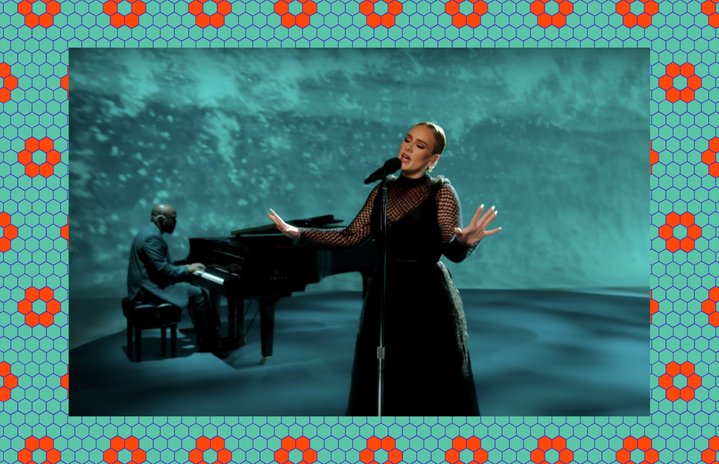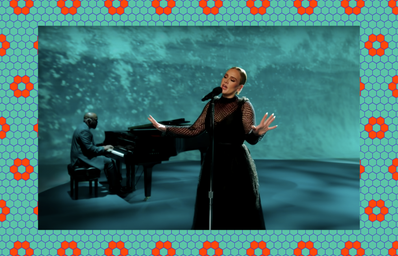Adele’s long-awaited fifth studio album 30 was released on November 19th, and according to Billboard, the album is this year’s biggest music debut yet. Just a month earlier, Adele released the lead single for her new album, “easy on me,” and it immediately broke Spotify’s record for the most streamed song in 24 hours. Her iconic music may be one of the few things Gen Z and millennials can agree on since her songs spark an emotional response from nearly everyone — but why is it that? And what actually happens to our brains and emotions when we listen to Adele?
According to a 2021 study published in Cognitive, Affective, and Behavioral Neuroscience, music can lead to enhanced emotional and cognitive experiences, especially if you tend to be an empathetic person. This might be why listening to Adele’s music feels like the equivalent of a FaceTime call with your best friend; not only is her music comforting and emotional, but it feels like you can genuinely relate to what she’s singing about (don’t you feel for her?!). Given that 30 is reportedly inspired by Adele’s recent divorce, the music and lyrics are all the more impactful; chances are, you’ve experienced a tragic breakup too, and reliving the memory can prompt a strong neurological and emotional response.
Now, you might be thinking: Can’t listening to sad music when you’re emotional make you even sadder? Maybe, but according to a 2013 study published in Frontiers in Psychology, listening to sad music like Adele’s can actually evoke pleasant emotions, even if you recognize that the music is sad in nature. When participants were asked to listen to sad music and provide data on their emotions, the study revealed that although most of them perceived the music itself as “tragic,” they reported positive emotions while listening to it. These findings counteract what many of us believe about sad music making us sadder, and may provide insight into why listening to Adele’s music is so cathartic.
In case you’re reluctant to listen to Adele or don’t particularly opt for heartfelt ballads about failed relationships, research shows that sad music can actually be beneficial for your mental health. According to a 2020 study published in the journal Emotion, researchers discovered that participants with depression preferred listening to sad music over happy music, and they reported feeling happier afterward. Again, this challenges the assumption many of us have about sad music making us sadder. Mabel Guzman, a music therapist who HC recently interviewed about music and sad girl fall, agrees, and says that creating a playlist containing sad music can actually be a healthy move for your emotional well-being.
In 2012, National Public Radio (NPR) spoke with John Sloboda, a professor of music psychology at London’s Guildhall School of Music and Drama, about another aspect of Adele’s music that makes it so evocative: a musical device called the “appoggiatura.” According to Merriam-Webster, an appoggiatura is “an embellishing note or tone” that clashes with the melody just enough to create a dissonant sound. According to Sloboda, the note causes musical “tension,” which can also trigger emotional “tension” in us; resulting in a strong emotional response when we listen to Adele’s music. In fact, Adele’s 2011 hit “Someone Like You” features appoggiatura notes sprinkled all over it — which may explain why the song resonates with fans all over the world.
Dr. Martin Guhn, a psychologist at the University of British Columbia, tells the Wall Street Journal that Adele tends to add appoggiatura and moderates her pitch at the end of long notes, which can cause “mini roller coasters of tension and resolution.” Dr. Guhn mentions that this type of dissonance can cause a listener to experience physiological reactions like changes in heart rate, sweating, goosebumps, and chills. That sounds like a classic Adele listening experience to me and makes sense as to why her heartfelt songs can make us bawl our eyes out.
So, it turns out that Adele’s music might be wired to make us cry — and we’re probably in for an emotional roller coaster with 30. Whether you blame it on her powerhouse vocals or the tiny appoggiatura notes that make just enough difference to make us grab our tissues, don’t be surprised if you find yourself shedding a few tears while listening.
In addition to being a certified tearjerker, Adele’s new album just might be a form of therapy (and it’s a lot cheaper than actually talking to a psych). Whatever your experience might be while listening to 30, don’t feel guilty if you get a little emotional. So, get ready. The album is finally here, and it’s time to face our feelings.
Studies
Kawakami, A., Furukawa, K., Katahira, K., & Okanoya, K. (2013). Sad music induces pleasant emotion. Frontiers in psychology, 4, 311.
Millgram, Y., Joormann, J., Huppert, J. D., & Tamir, M. (2015). Sad as a matter of choice? Emotion-regulation goals in depression. Psychological science, 26(8), 1216-1228.
Taruffi, L., Skouras, S., Pehrs, C., & Koelsch, S. (2021). Trait Empathy Shapes Neural Responses Toward Sad Music. Cognitive, Affective, & Behavioral Neuroscience, 21(1), 231-241.
Yoon, S., Verona, E., Schlauch, R., Schneider, S., & Rottenberg, J. (2020). Why do depressed people prefer sad music? Emotion, 20(4), 613–624.
Zentner, M., Grandjean, D., & Scherer, K. R. (2008). Emotions evoked by the sound of music: characterization, classification, and measurement. Emotion, 8(4), 494.


